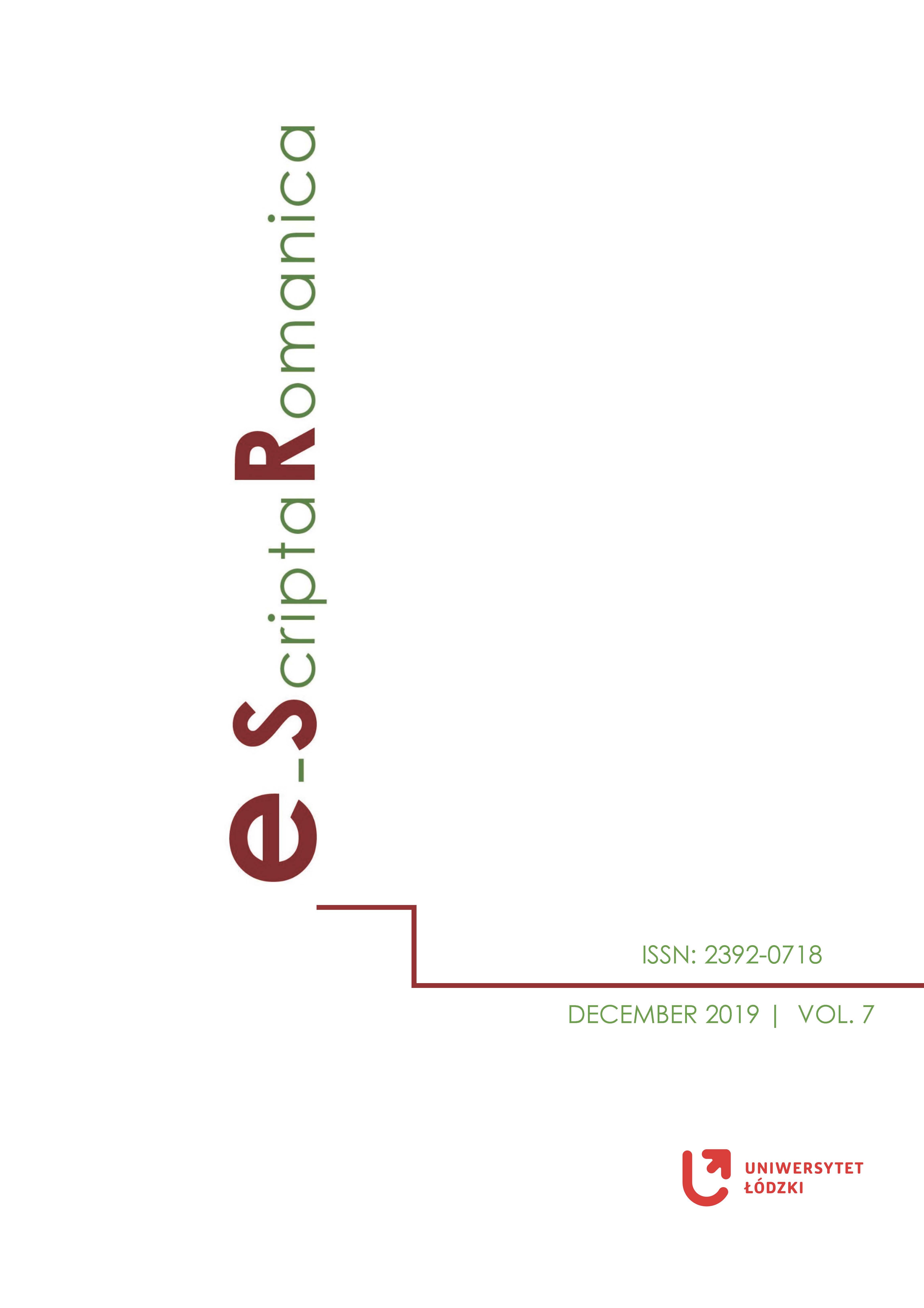La conceptualización lingüística del tabú en el discurso humorístico subversivo
DOI:
https://doi.org/10.18778/2392-0718.07.07Palabras clave:
tabú, humor verbal, comunicación eufemística, comunicación disfemísticaResumen
En la presente investigación, analizamos el papel del tabú como un elemento clave en el discurso humorístico subversivo para la transgresión de lo establecido (Mintz, 1985). En este sentido, partimos de la hipótesis general de que las cómicas analizadas conceptualizan tabúes relacionados con su identidad de género, por medio de eufemismos, disfemismos y ortofemismos, para romper con ciertos roles asociados a la mujer. Además, como segunda hipótesis de partida, creemos que el porcentaje de temas tabú está estrechamente relacionado con el estilo humorístico individual de cada cómica y que, por tanto, nos encontraremos con cifras muy dispares. Así pues, el presente trabajo examina la expresión del tabú por medio de la comunicación ortofemística, disfemística y eufemística en un corpus de análisis que recoge 15 monólogos segmentados en 504 secuencias humorísticas y que han sido representados por 15 monologuistas españolas. Los resultados de este estudio confirman que la comedia en vivo aporta el espacio público y social ideal para transgredir tabúes y, en el caso de la comedia femenina subversiva, sirve también para romper con algunos estigmas relacionados con la identidad de género.
Citas
ALLAN, K. & K. BURRIDGE (2006): Forbidden words: Taboo and the censoring of language. Cambridge University Press.
Google Scholar
DOI: https://doi.org/10.1017/CBO9780511617881
BELL, N. D. (2009): Responses to failed humor. Journal of Pragmatics, 41(9), 1825-1836.
Google Scholar
DOI: https://doi.org/10.1016/j.pragma.2008.10.010
BURRIDGE, K. (2012): Euphemism and language change: the sixth and seventh ages. Lexis. Journal in English Lexicology, 7, pp. 65-91.
Google Scholar
DOI: https://doi.org/10.4000/lexis.355
BUCARIA, C. & L. BARRA (eds.) (2016): Taboo Comedy: Television and Controversial Humour. London: Palgrave Macmillan.
Google Scholar
DOI: https://doi.org/10.1057/978-1-137-59338-2
CASAS GÓMEZ, M. (1986): La interdicción lingüística. Mecanismos del eufemismo y disfemismo. Cádiz: Universidad de Cádiz.
Google Scholar
CASAS GÓMEZ, M. (2012): The expressive creativity of euphemism and dysphemism. Lexis. Journal in English Lexicology, 7, pp. 43-64.
Google Scholar
DOI: https://doi.org/10.4000/lexis.349
CASAS GÓMEZ, M. (2018): Lexicon, discourse and cognition: terminological delimitations in the conceptualizations of linguistic taboo. En Pedraza, A. P. (ed.). Linguistic Taboo Revisited: Novel Insights from Cognitive Perspectives (Vol. 61). Berlín: Walter de Gruyter GmbH & Co KG.
Google Scholar
DOI: https://doi.org/10.1515/9783110582758-002
CESTERO MANCERA, A. M. (2015): La expresión del tabú: estudio sociolingüístico. Boletín de filología, 50(1), 71-105.
Google Scholar
DOI: https://doi.org/10.4067/S0718-93032015000100003
COATES, J. (1993): The acquisition of gender-differentiated language. Women, men and language: A sociolinguistic account of gender differences in language. London: Routledge,143-167.
Google Scholar
CRESPO-FERNÁNDEZ, E. (2016): Eufemismo y política: un estudio comparativo del discurso político local británico y español. Pragmalingüística, 24, 8-29.
Google Scholar
DOI: https://doi.org/10.25267/Pragmalinguistica.2016.i24.01
FREUD, S. [1967] 2003: Tótem y tabú. Madrid: Alianza.
Google Scholar
GOURNELOS, T. & V. GREENE (eds.) (2011): A decade of dark humor: How comedy, irony, and satire shaped post-9/11 America. Jackson: University Press of Mississippi.
Google Scholar
DOI: https://doi.org/10.14325/mississippi/9781617030062.001.0001
HERNÁNDEZ, P. A. (2002): El acto sexual es comer: descripcion lingüistico-cognitiva. RLA: revista de lingüística teórica y aplicada, 40, 7-26.
Google Scholar
HOLMES, J. & M. MARRA (2002): Over the edge? Subversive humor between colleagues and friends. Humor, 15(1), 65-88.
Google Scholar
DOI: https://doi.org/10.1515/humr.2002.006
KARACHALIOU, R. & A. ARCHAKIS (2015): Identity construction patterns via swearing: Evidence from Greek teenage storytelling. Pragmatics and Society, 6(3), 421-443.
Google Scholar
DOI: https://doi.org/10.1075/ps.6.3.05kar
LEGMAN, G. (1968): Rationale of the dirty joke: An analysis of sexual humour. Memphis: Castle Books.
Google Scholar
LINARES BERNABÉU, E. (2018): La atenuación como estrategia pragmática en el monólogo humorístico subversivo. Normas: revista de estudios lingüísticos hispánicos, 8(1), 215-228.
Google Scholar
DOI: https://doi.org/10.7203/Normas.v8i1.13436
LINARES BERNABÉU, E. & L. RUIZ GURILLO (En prensa): Humor subversivo y comedia femenina: efectos en el monólogo cómico en español. Libro editado por la Universidad Autónoma de Madrid.
Google Scholar
LOCKYER, S. & M. PICKERING (eds.) (2005): Beyond a joke: The limits of humour. New York: Springer.
Google Scholar
DOI: https://doi.org/10.1057/9780230236776
LOCKYER, S. (2011): From toothpick legs to dropping vaginas: Gender and sexuality in Joan Rivers' stand-up comedy performance. Comedy Studies, 2(2), 113-123.
Google Scholar
DOI: https://doi.org/10.1386/cost.2.2.113_1
MINTZ, L. E. (1985): Standup comedy as social and cultural mediation. American Quarterly, 37(1), 71-80.
Google Scholar
DOI: https://doi.org/10.2307/2712763
MYERS, L. B. & S. LOCKYER (2015): Do repressors use comedy as a strategy to avoid negative affect? En Moore K. A., Howard S. and Buchwald P. (eds.). Stress and Anxiety: Applications to Schools, Well-Being, Coping and Internet Use. Berlin : Logos Verlag Berlin GmbH. pp. 133 - 139.
Google Scholar
ORING, E. (1992): Jokes and their Relations. Lexington: University Press of Kentucky.
Google Scholar
PÉREZ, R. (2013): Learning to make racism funny in the ‘color-blind’era: Stand-up comedy students, performance strategies, and the (re) production of racist jokes in public. Discourse & Society, 24(4), 478-503.
Google Scholar
DOI: https://doi.org/10.1177/0957926513482066
PIZARRO PEDRAZA, A. (2013): Tabú y eufemismo en la ciudad de Madrid. Estudio sociolingüístico-cognitivo de los conceptos sexuales. Madrid: Universidad Complutense (Tesis doctoral).
Google Scholar
PLESTER, B. (2015): 'Take it like a man!': Performing hegemonic masculinity through organizational humour. Ephemera, 15(3), 537.
Google Scholar
RUIZ GURILLO, L. (2012): La lingüística del humor en español. Arco/Libros.
Google Scholar
RUIZ GURILLO, L. & E. LINARES-BERNABÉU (en prensa): Subversive humor in Stand-up comedy: Two case studies in Spanish. HUMOR: International Journal of Humor Research.
Google Scholar
STAPLETON, K. (2003): Gender and swearing: A community practice. Women and Language, 26(2), 22.
Google Scholar
STEINER, G. (2003): Lenguaje y silencio. Buenos Aires: Ediciones Gedisa.
Google Scholar
TARN, N. & M. PRECHTEL (1990): 'Comiéndose la fruta': metáforas sexuales e iniciaciones en Santiago Atitlán. Mesoamérica, 11(19), 73-82.
Google Scholar
Descargas
Publicado
Cómo citar
Número
Sección
Licencia

Esta obra está bajo una licencia internacional Creative Commons Atribución-NoComercial-SinDerivadas 4.0.










